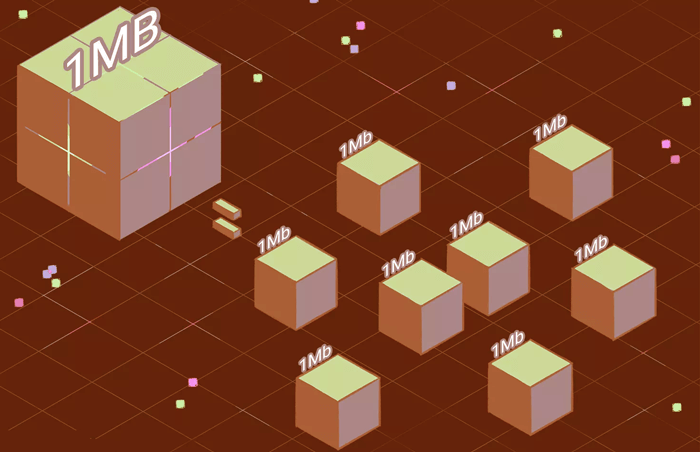How many megabits are there in a megabyte?In this article, we are going to discuss about megabit and megabyte. We will also see the no. of megabits in a megabyte. Megabytes per second (MBps) and Megabits per second (Mbps), both of the terms sound almost identical when spoken and both are abbreviated exactly with the same letters. In their abbreviation, the only difference is of the alphabet 'b' which is capitalized in the abbreviation of Megabyte (MB). Let's first see the meaning of both terms megabyte and megabit. MegabyteAn 'MB' is the unit symbol for the Megabyte. A Megabyte is formed by multiple unit bytes that denote the data size and used to store the digital information. A byte is made up of 8 bits. The word mega in the megabyte denotes the sixth power of 10, which means 106. A megabyte is larger than a kilobyte (Kb) and smaller than the gigabyte (Gb). It is also used to measure the video files, bitmap images, text format, and compressed/uncompressed audio files. MegabitA megabit is also a unit that is used to measure digital information. It is widely used to represent the speed of internet connection. A Megabit is represented as 'Mb'. Mbps (Megabit per second) is a measurement of data transfer rate. 'bps' or bits per second is said to be the number of bits that can move between two devices in a second. If we talk about internet speed, then it is the number of bits that come into your device every second. One kilobit per second (or kbps) is equivalent to 1,000 bps, whereas the one megabit per second (or Mbps) is equivalent to 1,000 000 bits per second. On the other hand, one gigabit per second (Gbps) is equivalent to 1,000,000,000 bits per second. We can also technically measure the speed in bytes per second. It can be easily done by taking the speed in bits per second, and then divide it by eight. Almost speed is not measured in bytes. So, the network speed listed for an internet connection is using bits per second. For instance, suppose an internet connection's network speed is 18.20 Mbps, it means that 18.20 megabits are being transferred every second. No. of megabits in a megabyteIt takes eight megabits (Mb) to make a megabyte (MB). The abbreviations of megabits and megabytes use the same letters, but they are not the same thing. There are 8 megabits in a megabyte. From the below image, we can understand the number of bits in a byte. 
Since there are 8Mb in 1MB, but there is a lot more to the answer. Now, let's see why it is important to know the difference between both Megabits and Megabytes. Why it matters to understand the difference between Megabit and Megabyte?Megabit and Megabyte are two different things, and it is important to know about both when you are dealing with your internet connection. Let's understand both terms using the below simple example. Example1: Suppose you are comparing the internet speeds of two service providers. You have read that Service1 delivers 8Mbps and Service2 delivers 8MBps. Now, in this situation, you will get confused between the internet speed offering by both providers if you are not aware of Megabits and Megabytes, and you will think what exactly the difference between their network speed as they seem identical. In this situation, you might just pick whichever is cheapest between both service providers. However, if you know about Mbps and MBps, you will understand that Service2 network speed is equal to 64Mbps, which is eight times faster than the network speed of Service1. Service1: 8Mbps = 1MBps Service2: 8MBps = 64Mbps If you want to choose the cheaper service, you will buy Service1, but if you require a high network speed, you can choose Service2. That's why it is important to know the difference between both Megabit and Megabyte. Example2: It is another example to understand why it matters to understand the difference between both Megabit and Megabyte. Suppose you have to download a file of size 500MB, and your internet speed is 100Mbps. Suppose you don't know about Megabit (Mb) and Megabyte (MB). In that case, you might estimate that this download will take only five seconds, as you have not noticed the capital alphabet B in the file size and also have not noticed the small alphabet b in your network speed. Since the file size is measured in Megabytes per second (MBps) and your network speed is in Megabits (Mbps), so the file size is eight times larger than your estimation, and it will actually take eight times more in downloading than your estimation, i.e., the file will take 40 seconds to download. Now, this file is short and 35 seconds more is not too bad when you expected 5 seconds. But if your file is large and you expect 5 minutes to download and it will take 35 minutes, downloading will be more frustrating. That's why it is important to know the difference between Megabits per second (Mbps) and Megabytes per second (MBps). So, in this article, we have discussed some differences between Megabit (Mb) and Megabyte (MB), and also seen the importance of knowing the difference between both terms. Hope this article will be helpful to you and will provide you a basic understanding of Megabit (Mb) and Megabyte (MB).
Next TopicWhat is CVV code
|
 For Videos Join Our Youtube Channel: Join Now
For Videos Join Our Youtube Channel: Join Now
Feedback
- Send your Feedback to [email protected]
Help Others, Please Share










